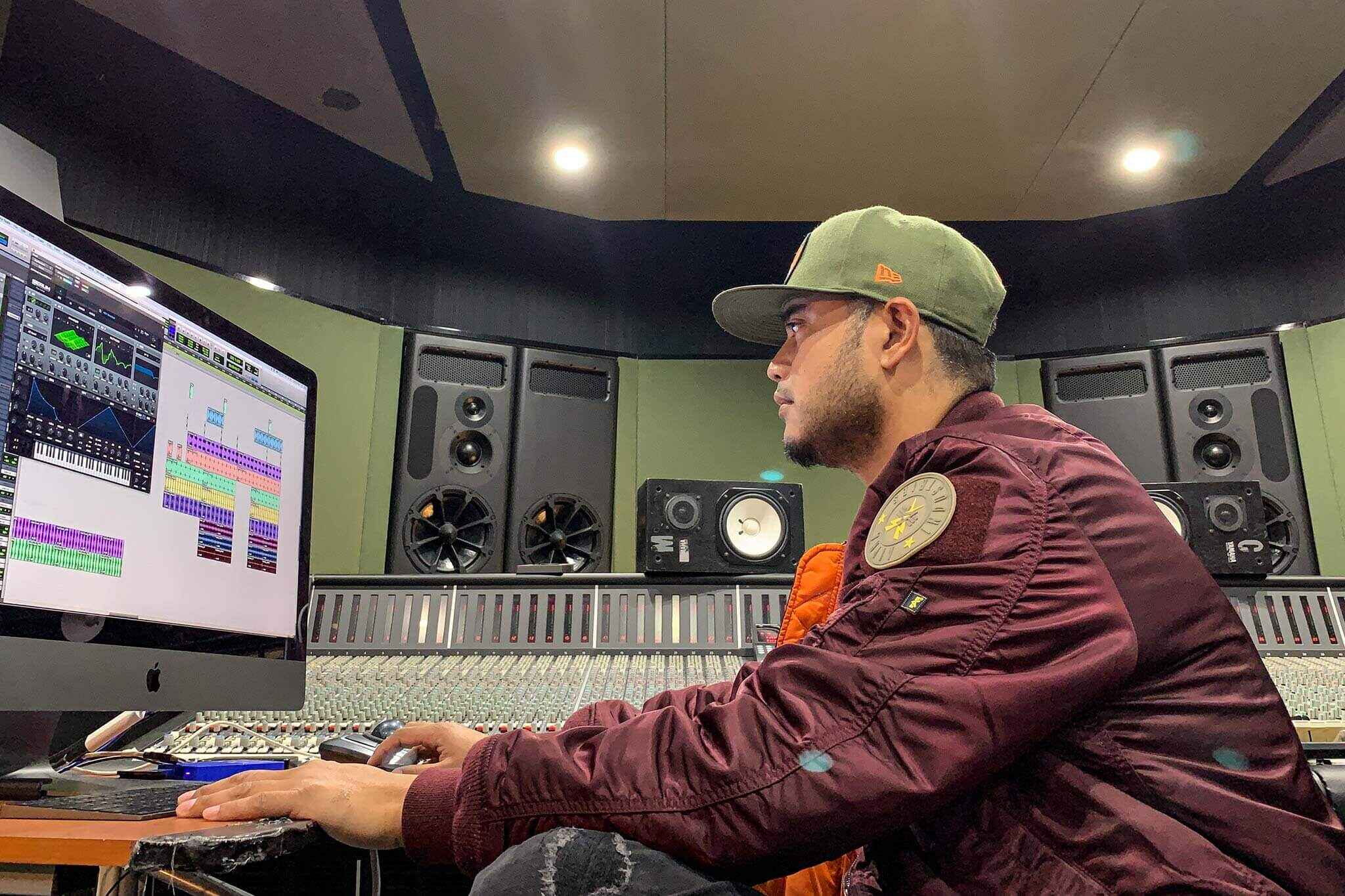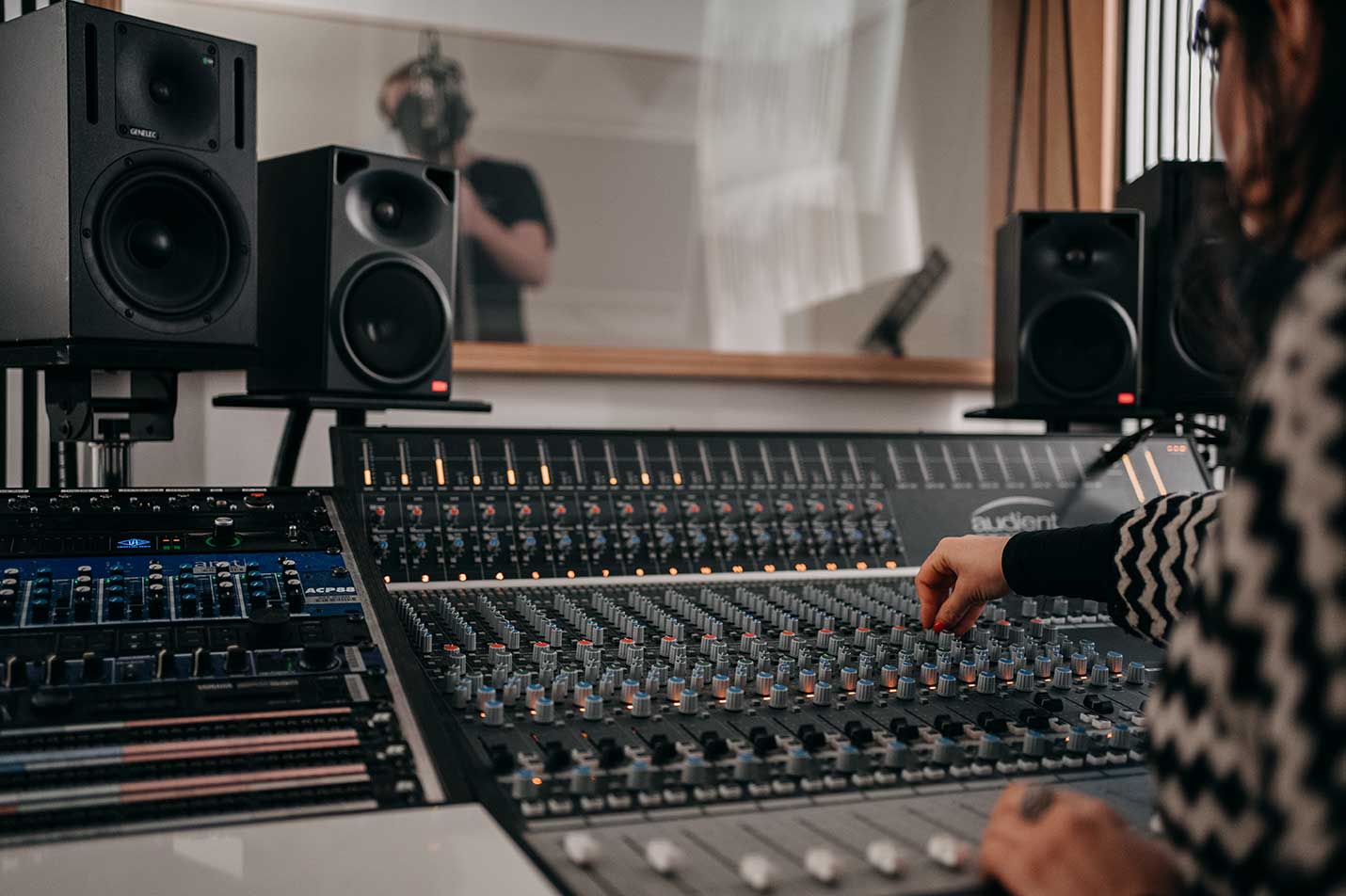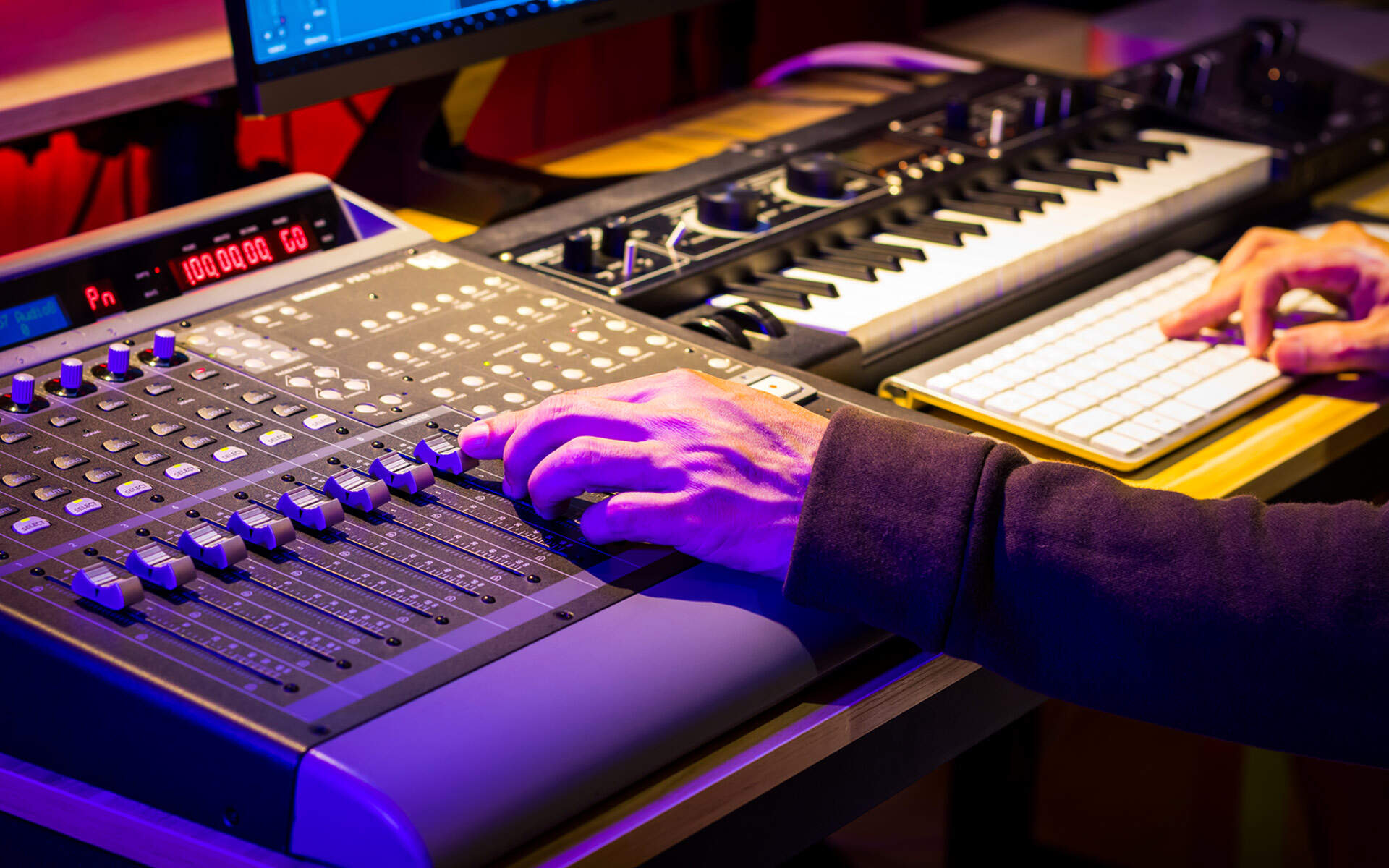Home>Production & Technology>Producer>How Hard Is It To Make It As A Music Producer


Producer
How Hard Is It To Make It As A Music Producer
Published: March 5, 2024
Discover what it takes to succeed as a music producer and learn the challenges of breaking into the industry. Get expert tips and insights.
(Many of the links in this article redirect to a specific reviewed product. Your purchase of these products through affiliate links helps to generate commission for AudioLover.com, at no extra cost. Learn more)
Table of Contents
Introduction
Becoming a successful music producer is a dream shared by many aspiring music enthusiasts. The allure of crafting captivating melodies, shaping the soundscapes of tomorrow, and working with talented artists is undeniably appealing. However, the path to success in the music production industry is riddled with challenges and requires a unique blend of creativity, technical prowess, and business acumen. In this article, we will explore the intricacies of making it as a music producer, shedding light on the skills, experiences, and hurdles that aspiring producers may encounter on their journey to the top.
The music production landscape is dynamic and ever-evolving, presenting both opportunities and obstacles for those seeking to carve out a niche in this competitive field. From navigating the complexities of digital audio workstations to understanding the nuances of music theory and composition, the role of a music producer demands a diverse skill set and a relentless passion for the art form. Moreover, the industry's reliance on networking, collaboration, and adaptability underscores the importance of cultivating a multifaceted approach to success.
As we delve into the world of music production, we will uncover the essential skills and experiences required to thrive in this realm. From technical proficiency in audio engineering to the ability to translate creative visions into tangible sonic masterpieces, the journey of a music producer is marked by a continuous quest for growth and innovation. Furthermore, we will examine the challenges that aspiring producers may encounter, ranging from fierce competition and self-doubt to the intricacies of navigating the business side of the industry.
Amidst these challenges, there are invaluable lessons and insights that can empower aspiring music producers to chart a course toward success. By embracing a mindset of continuous learning, honing their craft, and leveraging the power of digital platforms and social media, emerging producers can amplify their presence in the industry and connect with a global audience. Additionally, we will provide practical tips and strategies for aspiring music producers, equipping them with the tools and knowledge to navigate the complexities of the industry and elevate their creative endeavors.
As we embark on this exploration of the music production landscape, it becomes evident that the journey to success as a music producer is both demanding and rewarding. By unraveling the intricacies of this dynamic field and offering valuable insights, we aim to inspire and empower aspiring producers to pursue their passion with unwavering determination and a deep-seated love for the craft.
The Music Industry Landscape
The music industry is a multifaceted ecosystem that encompasses a diverse array of genres, artists, and creative endeavors. It serves as a dynamic platform where musical innovation converges with technological advancements and cultural influences, shaping the sonic tapestry of our society. Within this expansive landscape, music producers play a pivotal role, serving as architects of sound and collaborators in the creative process.
At the heart of the music industry lies a rich tapestry of genres, each with its own unique characteristics and audience appeal. From the infectious rhythms of pop and the emotive storytelling of folk to the electrifying energy of hip-hop and the intricate harmonies of classical music, the industry thrives on diversity and creative expression. This diversity presents both opportunities and challenges for music producers, who must navigate the nuances of different genres while staying true to their artistic vision.
Furthermore, the music industry is continually shaped by technological advancements, with digital platforms and streaming services revolutionizing the way music is consumed and distributed. This digital landscape has democratized the production and distribution of music, offering emerging producers unprecedented access to global audiences. However, it has also intensified competition, as aspiring producers vie for recognition in a crowded and ever-expanding digital marketplace.
Moreover, the music industry is deeply intertwined with cultural and societal influences, reflecting and shaping the zeitgeist of our times. From serving as a catalyst for social change to providing solace and inspiration during turbulent periods, music holds a profound sway over our collective consciousness. Music producers, therefore, bear the responsibility of capturing the spirit of the times and translating it into evocative musical compositions that resonate with audiences on a profound level.
In essence, the music industry landscape is a vibrant tapestry of creativity, innovation, and cultural significance. It offers a platform for aspiring music producers to explore their artistic potential, collaborate with diverse talents, and contribute to the ever-evolving narrative of music. Understanding the complexities and nuances of this landscape is crucial for aspiring producers, as it empowers them to navigate the industry with insight and adaptability, ultimately shaping their journey toward success.
The Role of a Music Producer
The role of a music producer is multifaceted and encompasses a diverse range of responsibilities that are integral to the creation and refinement of musical compositions. A music producer serves as a visionary, a technician, and a collaborator, breathing life into artistic concepts and guiding the sonic evolution of a piece of music. At the core of their role lies the ability to translate creative visions into tangible sonic expressions, leveraging their technical expertise and artistic sensibilities to orchestrate captivating musical experiences.
One of the primary responsibilities of a music producer is to provide creative direction and guidance throughout the production process. This involves working closely with artists to conceptualize and refine musical ideas, offering valuable insights and suggestions to enhance the overall quality and impact of the composition. From shaping the arrangement and instrumentation to fine-tuning the sonic palette, music producers play a pivotal role in sculpting the sonic identity of a piece of music, infusing it with depth, emotion, and resonance.
In addition to their creative contributions, music producers are also entrusted with the technical aspects of the production process. This includes overseeing recording sessions, managing the use of audio equipment, and ensuring the optimal capture of musical performances. Moreover, music producers are adept at leveraging digital audio workstations and production tools to manipulate and refine audio elements, applying sound engineering techniques to achieve a polished and professional sonic output.
Furthermore, the role of a music producer extends beyond the confines of the recording studio, encompassing a keen understanding of industry trends, market dynamics, and audience preferences. Producers are tasked with identifying and nurturing talent, forging collaborations with artists, and navigating the complexities of music distribution and promotion. Their ability to forge strategic partnerships and leverage digital platforms is paramount in amplifying the reach and impact of the music they produce, fostering connections with global audiences and driving the commercial success of their artistic endeavors.
Ultimately, the role of a music producer is characterized by a harmonious blend of artistic vision, technical proficiency, and business acumen. It requires a deep understanding of musical theory, composition, and production techniques, coupled with a keen awareness of industry trends and audience dynamics. By assuming this multifaceted role, music producers wield a profound influence on the sonic landscape, shaping the trajectory of musical innovation and leaving an indelible mark on the industry.
Skills and Experience Required
Becoming a successful music producer demands a diverse and comprehensive skill set, underpinned by a blend of technical expertise, creative acumen, and industry knowledge. Aspiring music producers must possess a deep understanding of music theory, composition, and arrangement, enabling them to craft compelling and harmonically rich musical compositions. Proficiency in playing musical instruments, such as piano, guitar, or drums, can enrich a producer's creative palette, fostering a deeper connection with the musical elements they seek to manipulate and refine.
Moreover, a strong command of digital audio workstations (DAWs) and music production software is essential for music producers to actualize their creative visions. Familiarity with industry-standard software, such as Ableton Live, Pro Tools, or Logic Pro, empowers producers to manipulate audio elements, craft intricate soundscapes, and achieve a professional sonic output. Additionally, expertise in sound engineering principles, including mixing, mastering, and audio processing, is crucial for ensuring the technical excellence of produced music.
In parallel to technical proficiency, music producers must cultivate a nuanced understanding of market trends, audience preferences, and the business dynamics of the music industry. This entails honing skills in networking, collaboration, and project management, as well as a keen eye for identifying emerging talent and forging strategic partnerships. Furthermore, a grasp of music marketing, promotion strategies, and digital distribution channels is imperative for producers to amplify the visibility and commercial viability of their musical endeavors.
Experience plays a pivotal role in shaping the trajectory of a music producer's career. Working in diverse musical environments, such as recording studios, live performance settings, and post-production facilities, provides invaluable hands-on experience and fosters a deeper understanding of the nuances of music production. Collaborating with artists from varied genres and cultural backgrounds enriches a producer's creative perspective, fostering adaptability and versatility in their approach to music creation.
Furthermore, seeking mentorship from seasoned music producers and industry professionals can offer invaluable insights and guidance, accelerating the learning curve and empowering emerging producers to navigate the complexities of the industry with confidence and acumen. Embracing a mindset of continuous learning, experimentation, and self-improvement is paramount for aspiring music producers to refine their craft, expand their creative horizons, and carve out a distinctive identity in the competitive realm of music production.
Challenges in Making It as a Music Producer
Embarking on a career as a music producer entails navigating a myriad of challenges that demand resilience, perseverance, and unwavering dedication. One of the foremost hurdles that aspiring producers encounter is the intensely competitive nature of the industry. With a multitude of talented individuals vying for recognition and opportunities, breaking through the noise and establishing a distinct presence can be an arduous endeavor. The sheer volume of aspiring producers amplifies the competition, underscoring the need for emerging talents to distinguish themselves through innovation, originality, and a unique artistic vision.
Moreover, the evolving dynamics of the music industry present a constant challenge for producers, necessitating adaptability and an acute awareness of industry trends. The advent of digital platforms and streaming services has revolutionized the consumption and distribution of music, reshaping audience preferences and consumption patterns. As a result, producers must remain attuned to these shifts, leveraging digital tools and social media to amplify their reach and engage with global audiences.
Financial constraints and resource limitations pose another significant challenge for emerging music producers. Acquiring state-of-the-art recording equipment, securing studio time, and investing in promotional efforts can strain financial resources, particularly for those starting their careers. Overcoming these barriers often requires resourcefulness, strategic planning, and a willingness to seek alternative avenues for collaboration and production.
Furthermore, self-doubt and creative blocks are common challenges that music producers grapple with. The pressure to consistently deliver innovative and compelling musical compositions can give rise to periods of creative stagnation and uncertainty. Overcoming these internal barriers demands resilience and a steadfast commitment to artistic growth, as well as a supportive network of peers and mentors who can offer guidance and encouragement during challenging times.
Navigating the business side of the industry, including negotiating contracts, managing royalties, and understanding intellectual property rights, presents a steep learning curve for emerging producers. Balancing the creative aspects of music production with the intricacies of the business landscape requires a multifaceted skill set and a proactive approach to professional development.
In essence, the journey of a music producer is marked by a tapestry of challenges, each demanding fortitude, adaptability, and a relentless pursuit of excellence. By acknowledging and addressing these challenges, aspiring producers can cultivate the resilience and acumen needed to surmount obstacles and carve out a meaningful and impactful presence in the dynamic realm of music production.
Tips for Success
-
Cultivate a Distinctive Sound: Embrace experimentation and innovation to develop a unique sonic identity that sets you apart in the competitive landscape of music production. Infuse your compositions with elements that reflect your individuality and creative vision, resonating with audiences on a profound level.
-
Continuous Learning and Skill Refinement: Stay abreast of advancements in music production technology, sound engineering techniques, and industry trends. Dedicate time to honing your craft, mastering new production tools, and expanding your musical repertoire to foster continuous growth and innovation.
-
Forge Collaborative Partnerships: Cultivate relationships with diverse artists, musicians, and industry professionals, fostering collaborative endeavors that enrich your creative perspective and expand your network. Collaborations offer opportunities for cross-pollination of ideas and the creation of compelling, genre-defying musical compositions.
-
Leverage Digital Platforms and Social Media: Harness the power of digital platforms and social media to amplify your presence, engage with audiences, and cultivate a loyal fan base. Utilize platforms such as YouTube, SoundCloud, and Instagram to showcase your work, connect with potential collaborators, and build a community around your music.
-
Embrace Entrepreneurial Mindset: Develop a keen understanding of the business side of music production, including marketing strategies, intellectual property rights, and revenue streams. Adopt an entrepreneurial mindset, seeking opportunities for strategic partnerships, licensing deals, and diversified revenue streams to sustain and grow your music production endeavors.
-
Seek Mentorship and Guidance: Embrace mentorship from seasoned music producers and industry veterans, leveraging their insights and experiences to navigate the complexities of the industry. Learn from their successes and challenges, gaining invaluable wisdom that can accelerate your professional growth and trajectory.
-
Remain Resilient and Persistent: Embrace setbacks and challenges as opportunities for growth, maintaining a resilient mindset and unwavering dedication to your craft. Persistence and tenacity are essential virtues in the journey of a music producer, enabling you to overcome obstacles and emerge stronger and more adept in your pursuits.
-
Stay Authentic and True to Your Vision: Amidst industry trends and external influences, stay true to your artistic vision and creative integrity. Authenticity resonates deeply with audiences and fosters a genuine connection, allowing your music to transcend commercial appeal and resonate on a profound emotional level.
By embracing these tips for success, aspiring music producers can navigate the intricacies of the industry with insight and determination, amplifying their creative impact and charting a course toward a fulfilling and impactful career in music production.
Conclusion
In the dynamic realm of music production, the journey to success is characterized by a tapestry of challenges, opportunities, and creative evolution. Aspiring music producers embark on a path that demands unwavering dedication, technical prowess, and a relentless pursuit of artistic innovation. The music industry, with its vibrant diversity of genres, technological advancements, and cultural influences, offers a canvas for producers to shape the sonic narrative of our times, leaving an indelible mark on the collective consciousness.
The role of a music producer is multifaceted, encompassing creative vision, technical expertise, and business acumen. Producers serve as architects of sound, collaborators in the creative process, and entrepreneurs navigating the complexities of the industry. Their ability to translate artistic concepts into tangible sonic expressions, leveraging digital tools and industry insights, empowers them to forge compelling musical compositions that resonate with global audiences.
Aspiring music producers are confronted with a myriad of challenges, from fierce competition and financial constraints to self-doubt and creative blocks. Navigating these hurdles demands resilience, adaptability, and a steadfast commitment to artistic growth. By embracing continuous learning, forging collaborative partnerships, and leveraging digital platforms, emerging producers can amplify their presence and connect with audiences on a profound level.
Moreover, the journey of a music producer is underpinned by a diverse and comprehensive skill set, encompassing technical proficiency, creative acumen, and industry knowledge. Cultivating a distinctive sonic identity, honing skills in sound engineering and music marketing, and seeking mentorship from industry veterans are pivotal in shaping the trajectory of a producer's career.
In conclusion, the path to success as a music producer is marked by the harmonious convergence of creativity, technical excellence, and entrepreneurial spirit. By embracing the tips for success and navigating the challenges with fortitude and insight, aspiring music producers can elevate their craft, amplify their impact, and carve out a meaningful and enduring presence in the dynamic landscape of music production. As they continue to innovate, collaborate, and inspire, music producers play an indispensable role in shaping the ever-evolving narrative of music, enriching our lives with their sonic tapestries and leaving an indelible legacy in the annals of musical history.











